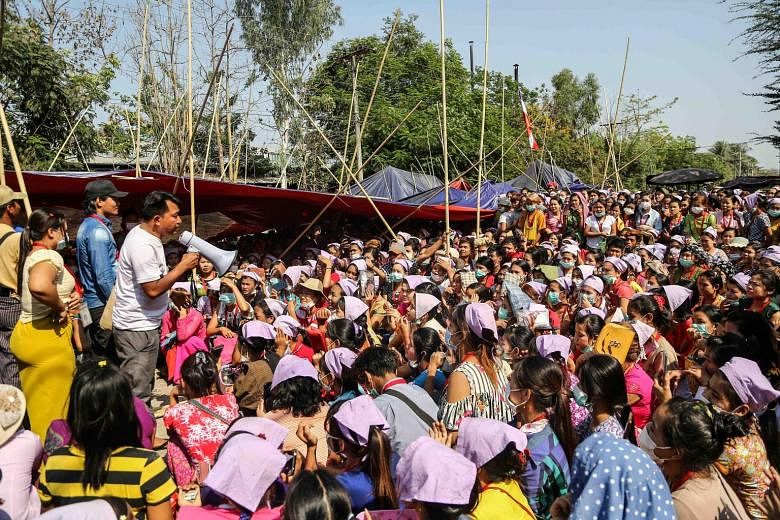BANGKOK • Ms Zar Zar Lin turned up for work at her backpack factory in Yangon on Monday, only to be sent home by her employers after half a day.
"They told us they were closing the factory," she said, a story that has become increasingly common in South-east Asia's apparel, bag and footwear sector as the coronavirus ravages the world.
Compensated with just about half of her 420,000 kyat (S$430) monthly pay, she is hoping to get another job despite dimming prospects in the Myanmar city.
Most of her other 1,000-odd colleagues, who were also compensated, are heading for home out of Yangon. Still, they are better off than some newly unemployed who were left empty-handed after their factories shut overnight and the owners disappeared.
"We are concerned that more (factory owners) might do this," said Dr Maung Maung Lay, vice-president of the Union of Myanmar Federation of Chambers of Commerce and Industry. "Because the world is in turmoil, it can happen any time now."
Textile workers are especially vulnerable.
As the pandemic roils the world, factories that first struggled with disruption of raw material supplies from China are now facing a collapse in demand from Western fashion firms.
In Myanmar, around 15,000 jobs in the textile industry have been lost, with about 40 factories closed, said Ms Khaing Zar Aung, president of the Industrial Workers Federation of Myanmar. The number of jobs shed could hit as high as 100,000.
Meanwhile, at least 57 factories in Cambodia have stopped operating, said the country's Prime Minister Hun Sen on Monday. As of yesterday, more than 18,000 workers had been temporarily laid off.
And in Vietnam, 30 per cent to 50 per cent of the country's 2.8 million textile workers could lose their jobs over the next two months, reported local media outlet VN Express.
Mr Ken Loo, secretary-general of the Garment Manufacturers Association in Cambodia, said buyers in the United States and Europe, which account for the majority of Cambodia's demand, have suspended orders for at least two months.
Some have also refused to take delivery of completed goods.
"We are talking about a complete break of cash flow. If we are not allowed to ship the goods, we don't have money to pay workers," he told The Straits Times, warning that many factories will go bankrupt without more government support.
In a White Paper issued last month, US-based Worker Rights Consortium demanded that global brands and retailers act "responsibly" and "take a more equitable approach to sharing the financial burden of the crisis, rather than sloughing all costs onto suppliers and, in turn, workers".
Apparel brands often do not pay for their goods until 60 or 90 days after they are delivered, it noted.
Many brands, however, are citing force majeure, or unforeseeable circumstances, when retroactively cancelling their orders or declining to pay for goods, "even though many of their contracts with suppliers do not appear to allow for cancellation on the basis of a global health crisis".
"In the end, it won't matter what the contracts say: Few suppliers can afford to sue a customer whose business they hope to some day recapture and even a supplier that wants to sue is unlikely to possess the money and time to do it successfully," it said.
Under these circumstances, the factories' "best bet for survival" is to shed workers fast and pay them as little compensation as possible, and for any remaining orders, keep the necessary workers in the production line regardless of health risks, it pointed out.
Naypyitaw has prepared a rescue package that includes 100 billion kyat of low-interest loans to help hard-hit sectors such as garment, manufacturing and tourism.
Cambodia has introduced measures allowing more liquidity for banks to give them room to help distressed borrowers. Mr Hun Sen last month also announced tax breaks and a bailout plan of up to US$2 billion (S$2.9 billion).
"But tax breaks are just the icing," said Mr Loo. "Now we are talking about whether companies will survive till the end of the year."
Meanwhile, the jobless workers in Yangon are wary of being stigmatised in their hometowns as possible sources of coronavirus infection, said Dr Maung Maung Lay.
Some are choosing to stay put in Yangon - where most of the nation's Covid-19 infections have been uncovered so far - despite the difficulty in securing jobs.
Mr Myo Aung, permanent secretary for the Myanmar Ministry of Labour, Immigration and Population, said the government has been working with employers and employees to find solutions.
Given the dire circumstances, Ms Khaing Zar Aung stressed that tripartite negotiations were the best way to go.
"Ideally, if employers really need to lay off workers because they cannot pay, they should discuss this with the union so that we can renegotiate wages to keep jobs," she said. "We are learning this from the experiences of other countries."
Tan Hui Yee












